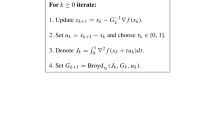Abstract
This paper provides a method for deriving newa posteriori error bounds for Newton-like methods in a Banach space under Kantorovich type assumptions. The bounds found are sharper than those of Miel [10] and include those recently obtained by Moret [12]. The applicability of our method is studied for other types of iterations including Newton’s method.
Similar content being viewed by others
References
J. E. Dennis, On the convergence of Newton-like methods. Numerical Methods for Nonlinear Algebraic Equations (ed. P. Rabinowitz), Gordon and Breach, New York, 1970, 163–181.
J. E. Dennis, Toward a unified convergence theory for Newton-like methods. Nonlinear Functional Analysis and Applications (ed. L. B. Rall), Academic Press, New York, 1971, 425–472.
P. Deuflhard and G. Heindl, Affine invariant convergence theorems for Newton’s method and extensions to related methods. SIAM J. Numer. Anal.,16 (1979), 1–10.
W. B. Gragg and R. A. Tapia, Optimal error bounds for the Newton-Kantorovich theorem. SIAM J. Numer. Anal.,11 (1974), 10–13.
L. V. Kantorovich, On Newton’s method for functional equations. Dokl. Akad. Nauk SSSR,59 (1948), 1237–1240.
L. V. Kantorovich, On Newton’s method. Trudy Mat. Inst. Steklov,28 (1949), 104–144.
L. V. Kantorovich and G. P. Akilov, Functional Analysis in Normed Spaces. Pergamon Press, Oxford, 1964.
H. J. Kornstaedt, Funktionalungleichungen und Iterationsverfahren. Aequationes Math.,13 (1974), 21–45.
G. J. Miel, The Kantorovich theorem with optimal error bounds. Amer. Math. Monthly.,86 (1979), 212–215.
G. J. Miel, Majorizing sequences and error bounds for iterative methods. Math. Comp.,34 (1980), 185–202.
G. J. Miel, An updated version of the Kantorovich theorem for Newton’s method. Computing,27 (1981), 237–244.
I. Moret, A note on Newton type iterative methods. Computing,33 (1984) 65–73.
J. M. Ortega and W. C. Rheinboldt, Iterative Solution of Nonlinear Equations in Several Variables. Academic Press, New York, 1970.
A. M. Ostrowski, La méthode de Newton dans les espaces de Banach, C.R. Acad. Sci. Paris,27(A) (1971), 1251–1253.
A. M. Ostrowski, Solution of Equations in Euclidean and Banach Spaces. Academic Press, New York, 1973.
F. A. Potra, On the convergence of a class of Newton-like methods. Iterative Solution of Nonlinear Systems of Equations (eds. R. Ansorge, Th. Meis and W. Törnig), Lecture Notes in Math. 953, Springer-Verlag, Berlin-Heidelberg-New York, 1982, 125–137.
F. A. Potra, On the aposteriori error estimates for Newton’s method. Beiträge Numer. Math.,12 (1984), 125–138.
F. A. Potra and V. Pták, Sharp error bounds for Newton’s process. Numer. Math.,34 (1980), 63–72.
L. B. Rall, Computational Solution of Nonlinear Operator Equations. Krieger, Huntington, N.Y., 1979.
W. C. Rheinboldt, A unified convergence theory for a class of iterative processes. SIAM J. Numer. Anal.,5 (1968), 42–63.
J. W. Schmidt, Regular-falsi-Verfahren mit konsistenter Steigung und Majorantenprinzip Period. Math. Hungar.5 (1974), 187–193.
J. W. Schmidt, Untere Fehlerschranken für Regular-falsi-Verfahren. Period. Math. Hungar.,9 (1978), 241–247.
T. Yamamoto, Error bounds for Newton’s process derived from the Kantorovich theorem. Japan J. Appl. Math.,2 (1985), 285–292.
T. Yamamoto, Error bounds for Newton’s iterates derived from the Kantorovich theorem. MRC Technical Summary Report, No. 2843, Univ. Wisconsin-Madison, 1985 and Numer. Math.,48 (1986), 91–98.
T. Yamamoto, A unified derivation, of several error bounds for Newton’s process. J. Comp. Appl. Math.,12 & 13 (1985), 179–191.
T. Yamamoto, Error bounds for Newton-like methods under Kantorovich type assumptions. MRC Technical Summary Report, No. 2846, Univ. Wisconsin-Madison, 1985.
T. Yamamoto, A convergence theorem for Newton’s method in Banach spaces. MRC Technical Summary Report, No. 2879, Univ. Wisconsin-Madison, 1985 and Japan J. Appl. Math.,3 (1986), 37–52.
A. I. Zincenko, A class of approximate methods for solving operator equations with nondifferentiable operators. Dopovidi Akad. Nauk. Ukrain. RSR, 1963, 852–855.
Author information
Authors and Affiliations
Additional information
This research was done while the author was visiting the Mathematics Research Center, University of Wisconsin-Madison, U.S.A. from March 29, 1985 to October 21, 1985.
About this article
Cite this article
Yamamoto, T. Error bounds for Newton-like methods under Kantorovich type assumptions. Japan J. Appl. Math. 3, 295–313 (1986). https://doi.org/10.1007/BF03167104
Received:
Revised:
Issue Date:
DOI: https://doi.org/10.1007/BF03167104




